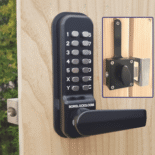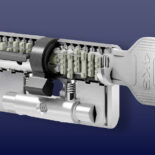Home security is evolving rapidly, driven by technological advancements and a growing demand for safer homes. From artificial intelligence (AI) to biometrics, the future of home security is set to be smarter, more intuitive, and more comprehensive than ever before. Let’s explore the emerging technologies and trends shaping the future of home security and what you can expect in the near future.
AI-Powered Surveillance Systems
Artificial intelligence is becoming a game-changer in home security. AI-powered cameras and surveillance systems can analyse real-time video footage and detect unusual activity without constant human monitoring.
What's New in AI Home Security?
- Facial Recognition and Behaviour Analysis: AI can identify familiar faces and differentiate between family members, guests, or potential intruders. Behaviour analysis can also spot suspicious actions like loitering or trespassing.
- Enhanced Object Recognition: AI-based systems can distinguish between a human, animal, or a moving object like a vehicle, reducing false alarms caused by pets or other non-threatening movements.
The Advantage:
AI-powered systems learn over time, becoming more accurate and personalised to your specific security needs.
Biometric Access Control
Biometric security is on the rise, offering secure, keyless access to homes. In the near future, expect to see more advanced biometric access systems that are not only secure but also easy to use.
What to Expect?
- Fingerprint and Facial Recognition Door Locks: Already emerging, these systems will become faster and more accurate, recognising faces under varying lighting conditions or from different angles.
- Voice and Iris Recognition: High-security biometrics like iris scanning and voice recognition will add additional layers of protection, offering options for multi-factor authentication to make your home nearly impenetrable.
The Advantage:
Biometric systems reduce the risk of traditional key theft or duplication, providing personalised and tamper-proof access control.
Smart Home Integration and the Internet of Things (IoT)
As smart homes become more widespread, home security is becoming part of a larger, interconnected ecosystem. The Internet of Things (IoT) will play a pivotal role in integrating security devices for seamless communication.
Innovations in IoT Security
- Seamless Device Communication: Smart cameras, door locks, alarms, and household appliances like lights and thermostats will communicate with each other. For example, if an intruder is detected, smart lights can flash to alert neighbours, and doors can automatically lock.
- Remote Management and Automation: Homeowners can remotely control security systems and automate routines based on specific triggers. For instance, your home can arm itself automatically when you leave or disarm upon your arrival.
The Advantage:
An interconnected IoT system creates a highly efficient and responsive security system, providing real-time protection and convenience.
Advanced Smart Sensors
Sensors are the backbone of any security system, and they are becoming more sophisticated. Future smart sensors will detect potential threats more accurately and monitor a wider range of conditions in your home.
What’s Coming Next?
- Smart Motion Detectors: Future motion sensors will not only detect movement but also distinguish between normal and suspicious activity, based on speed, size, and pattern.
- Environmental Monitoring Sensors: Beyond security, sensors will protect against environmental hazards like smoke, carbon monoxide, water leaks, and temperature changes, sending real-time alerts to prevent damage or accidents.
The Advantage:
Advanced sensors add multiple layers of security to your home, offering both intrusion detection and protection from environmental dangers.
Drone-Based Home Surveillance
Drones are expected to be a significant part of the future home security landscape. They provide dynamic and wide-ranging surveillance that stationary cameras cannot offer.
The Potential for Drones in Home Security
- Automated Patrolling: Drones can be programmed to patrol the perimeter of your property at specific intervals, providing live video feeds to your mobile device or security system.
- Intruder Tracking: If a break-in is detected, drones can automatically deploy to track intruders, capturing their movements in real-time while sending the footage to homeowners and law enforcement.
The Advantage:
Drones offer flexibility and coverage that traditional security systems lack, acting as both a deterrent and a means to capture evidence of intrusions.
Augmented Reality (AR) and Virtual Reality (VR) for Home Security
Augmented and virtual reality technologies are set to enhance how we interact with and monitor our home security systems.
Future Applications of AR and VR
- Virtual Security Tours: VR allows homeowners to conduct virtual tours of their home’s security setup, checking camera angles, access points, and weak spots without being physically present.
- AR-Based Security Alerts: AR could provide real-time security alerts through smart glasses or phones, displaying information like intruder location, potential vulnerabilities, and live camera feeds superimposed over surroundings.
The Advantage:
AR and VR offer immersive, efficient management and response to security issues, enhancing real-time situational awareness.
Blockchain Security Protocols
As digital smart homes rise, robust cybersecurity is essential to prevent hacking and tampering. Blockchain technology will play a crucial role in securing data flow between smart home devices.
How Blockchain Enhances Security
- Encrypted Communication: Blockchain protocols ensure encrypted communication between all smart home devices, making it very difficult for cybercriminals to intercept or manipulate data.
- Decentralised Security Systems: Rather than relying on a central server, blockchain enables decentralised security networks, reducing single points of failure and improving overall smart home security.
The Advantage:
Blockchain provides a highly secure, tamper-proof method for managing home security systems, protecting both your physical property and digital data.
24/7 Professional Monitoring with AI
While self-monitoring through smart devices is becoming more common, the future will see a combination of AI-driven alerts and 24/7 professional monitoring services.
Enhancements to Monitoring
- AI-Enhanced Alert Filtering: AI can quickly distinguish between false alarms and actual threats, reducing unnecessary callouts while ensuring rapid response to real incidents.
- Human and Machine Collaboration: Monitoring services will blend human oversight with AI analysis, ensuring the quickest and most appropriate response to each security event.
The Advantage:
Combining human intuition with AI's speed and analytical capabilities will lead to a more accurate, swift, and reliable response to security incidents.
Conclusion: The Future of Home Security
The future of home security is set to be more intelligent, integrated, and autonomous than ever before. From AI-powered surveillance to drone patrols and blockchain-enhanced cybersecurity, home security is evolving to meet the needs of the modern homeowner. These innovations not only offer heightened security but also provide greater convenience and peace of mind.
As these technologies continue to develop, it’s wise for homeowners to stay informed and consider how future-forward security solutions can enhance the protection of their homes and families. The future of home security is just around the corner, bringing smarter, safer, and more connected homes.






